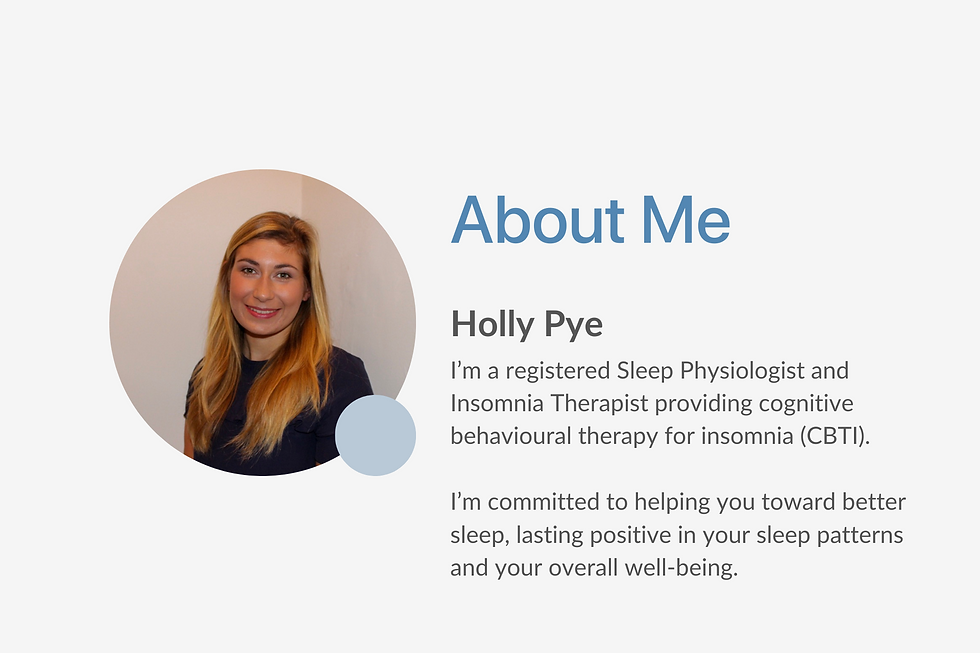Sleep Quantity vs. Quality: What Really Matters?
- Feb 7, 2025
- 4 min read
We’ve all heard the advice: "Get 8 hours of sleep per night." But what if you’re in bed for 8 hours and still wake up feeling exhausted? Does that mean sleep quantity isn’t as important as we think? Or do we need to focus more on sleep quality?
The truth is, both matter - but not always in the way you might expect.

The Case for Sleep Quantity
Sleep quantity is the total number of hours you sleep each night. Most adults need somewhere between 7 and 9 hours, but there are some people who thrive on less, while others need more.
Not getting enough sleep is an obvious problem. If you’re regularly getting less than six hours, your brain and body simply don’t have the time to recover. Sleep deprivation can affect:
Memory and concentration – Ever tried to focus after a bad night’s sleep? It can be like thinking through fog.
Mood – Short sleep is linked to anxiety, irritability, and even depression.
Physical health – Long-term sleep deprivation raises the risk of heart disease, diabetes, and a weakened immune system.
So yes, getting enough sleep is important - but it’s not the full picture.
Why Sleep Quality Might Matter More
You could spend 10 hours in bed, but if your sleep is fragmented, shallow, or restless, it’s not doing you much good. Sleep quality is about how well you sleep, not just how long.
Signs of good sleep quality include:
Falling asleep easily (within around 20 minutes)
Sleeping through the night with few awakenings
Waking up feeling refreshed and not groggy
On the flip side, if you toss and turn, wake up multiple times, or feel exhausted despite spending enough time in bed, your sleep quality needs work.
What Messes Up Sleep Quality?
Several things can stop you getting a good night’s sleep, including:
Stress & overthinking – If your brain can’t switch off, sleep won’t come easily. If you have anxiety about sleep itself and worry too much about whether you’ll sleep well, that alone can keep you awake.
Not enough daylight exposure – If you're inside most of the day, this day can mess up your circadian rhythm, making it harder to feel sleepy at night. Try to get at least 30 minutes of natural light in the morning.
Too much screen time – Blue light from phones and laptops can suppress melatonin, making it harder to fall asleep.
Caffeine, nicotine & alcohol – Caffeine lingers in your system for hours, nicotine is a stimulant, and alcohol disrupts deep sleep (even if it helps you fall asleep initially).
Inconsistent sleep schedule – Going to bed and waking up at totally different times every day can confuse your body clock.
Sleep associations – If you do work, scroll on your phone, or watch TV in bed, your brain starts associating your bed with being awake instead of sleeping.
Underlying sleep issues – Conditions like insomnia, sleep apnoea, or restless legs syndrome can seriously impact sleep quality.

So, What’s More Important?
If you had to choose between sleeping for fewer hours but deeply versus getting plenty of hours but poor-quality sleep, a short but high-quality sleep would probably leave you feeling better.
That said, if you’re constantly not getting enough, even high-quality sleep won’t be enough to fully restore your body. There’s a balance:
Too little sleep (even if it’s good quality)? Not enough recovery time.
Plenty of hours but poor quality? You’ll still feel drained.
Ideally, aim for both sufficient hours and solid, deep sleep - but if your sleep feels broken, improving quality is a great place to start.
How to Improve Sleep Quality
If you’re struggling with sleep, here are a few changes that can make a big difference:
Improve your morning routine
Aim to wake up at the same time every day - even on weekends. This helps regulate your body clock and makes it easier to fall asleep in the evenings.
Create a bedroom that promotes sleep
Make your room dark, cool, and quiet, invest in a comfortable mattress and pillow, and remove distractions - no scrolling on your phone in bed!
Limit stimulants before bed
Avoid caffeine in the afternoon and evening (it can stay in your system for many hours). Even if you are someone who falls asleep easily after a coffee, it's probably having an effect on your deep sleep. Be mindful of alcohol - it may help you fall asleep, but it also reduces sleep quality.
Wind down before sleep
Dim bright lights and put away your devices or at least 30 minutes before bed. Try relaxing activities like reading, journaling, or light stretching to slow your mind ready for bed.
Manage Stress & Overthinking
If your mind races at night, try a "brain dump" - write down your thoughts before bed. Deep breathing or meditation can help slow down an anxious mind.
Look for Underlying Sleep Issues
If you’re consistently waking up tired despite doing everything right, conditions like insomnia or sleep apnoea could be the cause. Cognitive Behavioural Therapy for Insomnia (CBTI) is one of the most effective treatments for sleep issues.

Both sleep quantity and quality matter - but if you’re hitting your sleep target and still waking up exhausted, it’s time to focus on quality.
Instead of just counting the hours, pay attention to how well you sleep. Small changes to your habits, environment, and routine can make a big difference in how rested you feel.
If sleep is a struggle, CBTI can help you rebuild healthy sleep patterns and overcome insomnia.
Want to learn more? Check out other resources in our Education Hub or book a free consultation to find out how CBTI can improve your sleep.





Comments